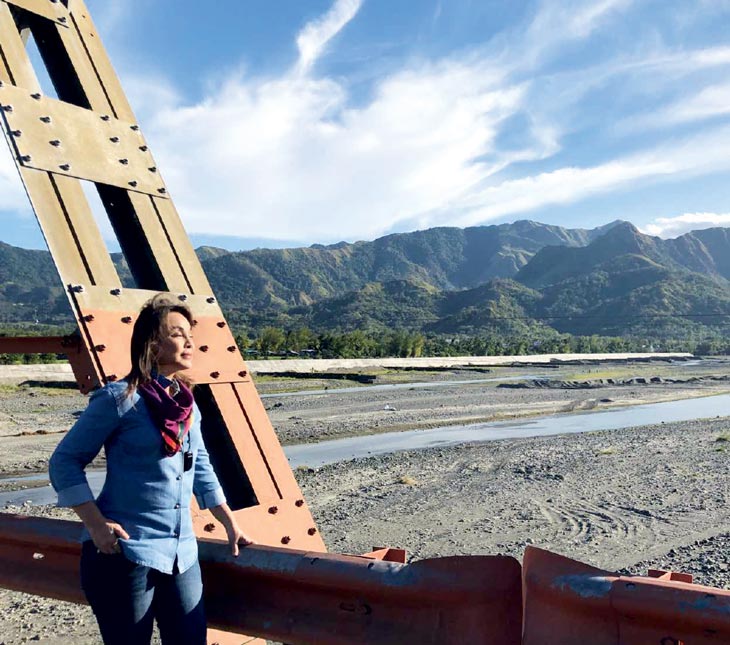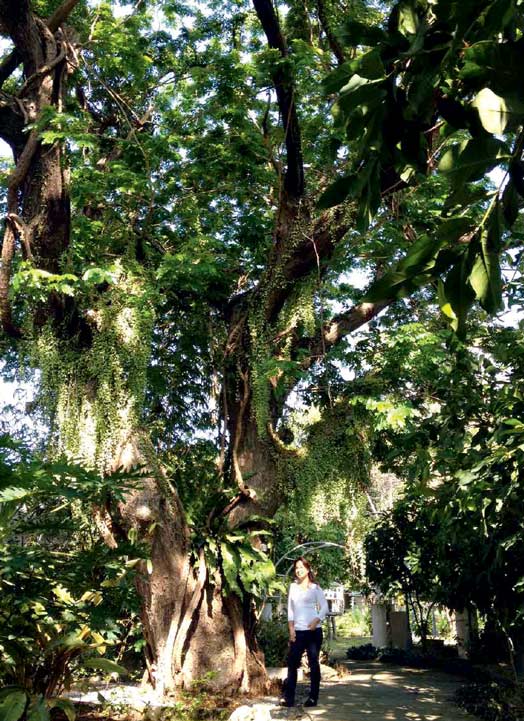As a broadcast journalist and a lawmaker, the House Deputy Speaker has continued to focus her platform and office on issues that plague Mother Earth
READ ALSO: Senator Loren Legarda On Success And Failure
Having grown up in a family compound in Malabon filled with various kinds of trees and plants, Loren Legarda says that caring for the environment has been a way of life for her.
But more than that, it has become a crusade for the Antique representative and House Deputy Speaker. Few can say that they have done as much as her for the environment in her years of public service and high-profile media work.

“In my more than 20 years as a broadcast journalist, I saw how environmental degradation and climate change affected the society’s poorest and most vulnerable sectors,” Legarda says.
That’s why, she adds, she championed sustainability and environment protection by bolstering public awareness through her shows like PEP Talk, Earth Link, The Inside Story, the last one running up until she won a seat in the Senate in 1998.
Important conversations
Over the years, Legarda has had many opportunities to visit different parts of the country and she’s had many conversations with people from countless communities whose concerns are rooted in the world we inhabit.
Among them are “farmers whose fields were time and again devastated either by drought or flooding; the indigenous peoples whose rights over their ancestral domains were threatened by development projects; community leaders who were deeply engaged in the preservation of endangered species such as the tamaraws in Mindoro and tarsiers in Bohol; the child miners of Paracale, Camarines Norte and the residents in Compostella Valley whose safety and health were put at risk due to erroneous mining practices in these areas,” Legarda lists.
This also includes residents of places such as Tacloban, Marikina, Laguna, and Aurora who have lost family members, properties, and livelihood because of typhoons like Yolanda, Frank, and Ondoy.
“The personal experiences they shared with me or the conditions they were in that I witnessed for myself only challenged me even more to take up the cudgels not only for their welfare but also for the environment and for Mother Nature,” Legarda says.
Global plea
Climate Change—no matter how some people or world leaders might want to deny it—is real, and its effects can be catastrophic. Legarda has been talking about this for decades, way before it became the desperate global plea it is today.
“People viewed climate change then as an abstract issue best reserved for experts and scientists,” she says. “I would like to be an instrument to educate the people that climate change is a threat to our basic human rights.”
Legarda views dealing with climate change as a matter of life and death, with enormous and lingering socio-economic consequences. In fact, she says, its effects are many times more than the pandemic: up to $600 trillion in losses by the end of the century if the world misses the goals set by the Paris Agreement.
“The observed temperature in the country, according to PAGASA, is rising at an average rate of 0.1°C per decade and is projected to increase by as much as 0.9°C to 2.3°C by 2050,” Legarda says. “This is expected to cause drastic changes in weather patterns, an increase in frequency, intensity and duration of storms and floods.
Yolanda occurred when global warming was less than a degree Celsius above pre-industrial levels. Future typhoons could be more intense beyond 1°C. “And yet, what might be the bigger threat is that which we can’t see,” the 61-year-old public official says.
Filipino scientists project declines in precipitation that surpass even the extremes of the observed range of rainfall in Central Mindanao, according to Legarda. Over the next decades, conflict-rife provinces such as Sultan Kudarat and South Cotabato are expected to experience acute rainfall declines that will threaten food and water security.
PAGASA also projects that sea-level rise in the country will increase by about 20 centimeters under a high emission scenario. This might worsen storm surge hazards.
“This will put at risk 60 percent of LGUs covering 64 coastal provinces, 822 coastal municipalities, 25 major coastal cities, and an estimated 13.6 million Filipinos that would need relocation,” Legarda says.
Empowering tools
To avoid the point of no return, the lawmaker says we need to exponentially scale up (globally) renewable energy systems, energy efficiency, and electrification of transport systems, and the transformation of sectors and industries toward low-carbon development.
“We cannot wait for another Ondoy or Yolanda again before we strengthen our step toward climate justice,” she says. “As a public servant, I think that it is my moral responsibility to our people and my commitment to good governance to ensure that the nation pursues resilient growth for our economy, our people and our children’s future.”
Having been a member of both houses of Congress over the years, Legarda has authored, sponsored, and passed quite a few laws that address different ecological issues.
These include the Clean Air Act, the Clean Water Act, the Ecological Solid Waste Management Act, the Renewable Energy Act, the People’s Survival Fund Law, the Environment Education and Awareness Act, Green Jobs Act, and the Expanded National Integrated Protected Areas Act.

Waste not
Apart from climate crisis, Legarda sees plastic pollution as an equally pressing ecological concern.
“Single-use plastics cause threats to the environment, and marine life and biodiversity,” she says. “Plastic products also worsen global warming and climate change due to the amount of fossil fuels used in the production and transportation.”
Legarda points out that the law on Ecological Solid Waste Management is already two decades old. However, Metro Manila’s landfills continue to overflow and its waste diversion rate—or how many of us reuse, recycle, or compost—remains at only 48 percent. (Outside of NCR, it is just 46 percent.)
“We Filipinos are still dependent on the ‘sachet economy.’ We used and discarded about 164 million pieces of sachets in 2019,” the representative says, adding that the Philippines remain as one of the world’s worst plastic polluters, despite being among the most vulnerable to the severe consequences of its unbridled production, thoughtless consumption, and wanton disposal.
“Plastics are a waste management nightmare, roughly two-thirds of all the plastic the world has ever produced has been released back into the environment,” Legarda says. “The irresponsible waste management contributes highly to the effects of climate change, flood, marine ecosystem degradation, death and poisoning of animals, among others.”
Legarda has been campaigning for the full implementation of the Ecological Solid Waste Management Act since it was enacted in 2001. Unless the quality of waste management increases in a meaningful way, she says we would be responsible for much more plastic waste and unmanaged garbage in the coming years. “And we will have to hand down an irreparably damaged world to our future generations,” she adds.
And, while the country’s emissions continue to be low in relation to the rest of the world, Legarda says that a low-carbon development pathway and practices rooted in sustainability must be pursued.
“Green transformation across the sectors of energy, transportation, industry, and agriculture must happen at an unprecedented scale, enabled by enhanced support from developed countries as promised under the Paris Agreement,” she says.
All industries must respond to the global imperative and consumer demand to go green, Legarda emphasizes.
“They must that integrating sustainability and green practices into their operations is crucial in ensuring the longevity and profitability of their businesses,” she says. “They must harness innovation and technology to unlock potential for sustainable and climate-friendly alternatives.”

Lifestyle change
Legarda believes that everyone is capable of creating change and integrating environment-friendly practices into their daily lives.
“We can start from the comfort of our homes by living a low-carbon lifestyle,” she says. We can start being mindful of our electricity consumption, using low carbon technologies, conserve water, plant more trees, properly segregate waste, look into renewable energy, and perhaps grow our own food.
The lawmaker urges us to be more mindful of our environment by following our environmental laws, veering away from the throw away culture, and working toward sustainability and resilience and a zero-waste economy.
“As stewards of the earth, we shape the state of our environment,” Legarda says. “We should be responsible for every action we take to ensure that we and our future generations will live in a safe, clean, healthy and resilient world.”
The full story on Deputy House Speaker Loren Legarda is in Volume 2 of Lifestyle Asia 2021.





